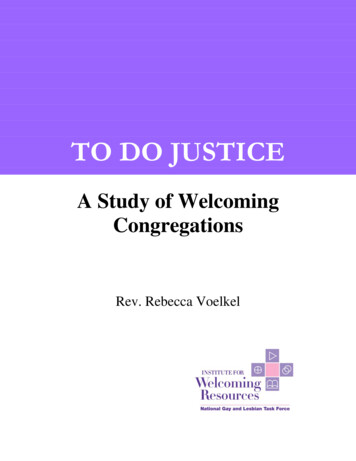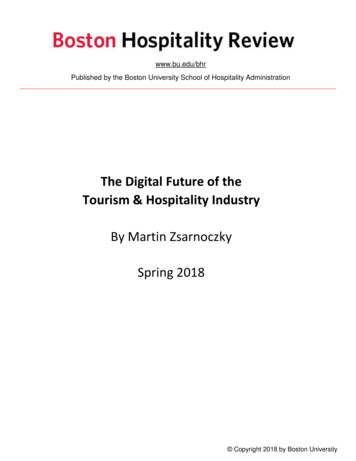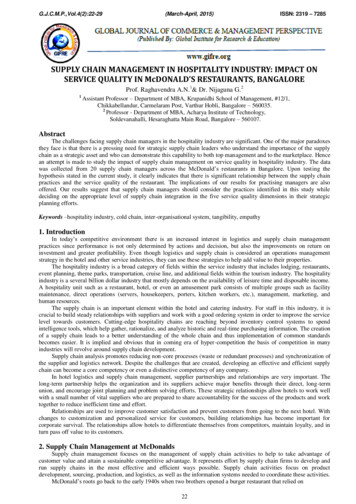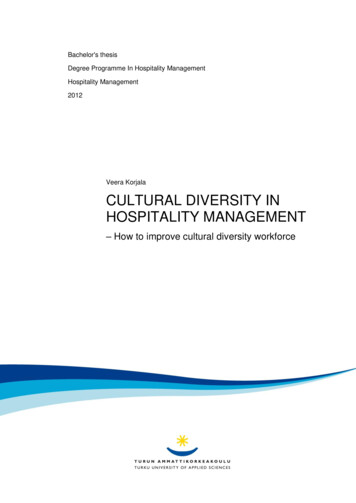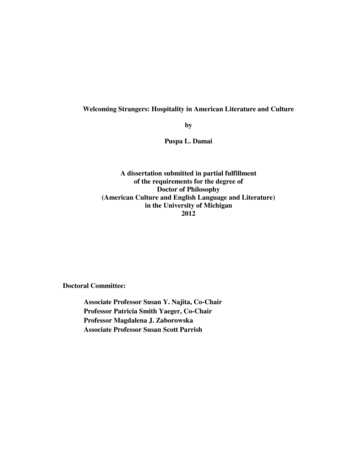
Transcription
Welcoming Strangers: Hospitality in American Literature and CulturebyPuspa L. DamaiA dissertation submitted in partial fulfillmentof the requirements for the degree ofDoctor of Philosophy(American Culture and English Language and Literature)in the University of Michigan2012Doctoral Committee:Associate Professor Susan Y. Najita, Co-ChairProfessor Patricia Smith Yaeger, Co-ChairProfessor Magdalena J. ZaborowskaAssociate Professor Susan Scott Parrish
Puspa L. Damai—————————2012
For my mom, Deva Devi&In memory of my father, Gopal Ramii
Acknowledgements“Welcoming Strangers: Hospitality in American Literature and Culture” is aboveall an exercise in gratitude – my gratefulness to America for providing me hospitality; tomy mentors and supervisors in the United States and in Nepal for their incalculable giftof education; and to all the academic institutions in the United States and around theworld for granting me an intellectual refuge to conduct and complete my doctoralresearch. Writing a dissertation is a collective endeavor undertaken with the support of anumber of individuals and institutions, and my dissertation is no exception to it. It wouldhave been impossible to complete the dissertation without the supervision of mydissertation committee chairs, Susan Najita and Patricia Yaeger. Their wisdom andgracious guidance have shaped and transformed this dissertation. Professor Najita’sinsightful and exhaustive comments on the drafts of the chapters, and Professor Yaeger’sintriguing suggestions on analyzing texts and putting heartbeats into my writing willremain true sources of inspiration and provide direction to my academic activities evenbeyond the completion of my doctoral work at Michigan. I am equally indebted to mydissertation committee members Magdalena Zaborowska and Susan Scott Parrish fortheir keen interest in my dissertation project, generous advising and invaluable commentsand suggestions. Professor Parrish’s comments and suggestions expanded myunderstanding of American literary studies, while Professor Zaborowska’s suggestions oniii
methodology and interdisciplinary research have deepened my knowledge of Americancultural studies.I would like to thank Vince Diaz, Frieda Ekotto and Sandra Gunning for theirsupervision and support during my comprehensive exams. I am also indebted to PhilDeloria, Michael Witgen, Andrea Zemgulys, Christi Merrill and Mamadou Diouf fortheir inspiring seminars. My deepest gratitude goes to Scott Michaelsen, my mentor atMichigan State University, for believing in me and my work and for unconditionallycoming to my rescue. I would also like to thank David Stowe, Stephen Rachman, AnnLarabee and Salah Hassan for their continued friendship and support. I am truly indebtedto Judith Butler, Wendy Brown, Dominick LaCapra, Tracy McNulty and Homi Bhabhafor their advice and suggestions on my dissertation project.I am grateful to Shreedhar Lohani, my mentor in Nepal, who has always gone outof his way to help me at every step of my life. I would also like to thank Arun Gupta,Ammar Raj Joshi, Bamdev Adhikari and Shankar Bastakoti for being admirablecolleagues and friends.A number of institutions provided the much needed resources and refuge topursue and complete my doctorate in the United States. Thanks are due to the FulbrightCommission of Nepal for grating me fellowships and making it possible for me to pursuehigher studies in the United States; to The School of Criticism and Theory at Cornell foran enchanting summer of theory and critical reflection; to the Institute for the Humanitiesat the University of Michigan for a year-long fellowship; to the JFK Library in Boston,where I collected the material on the Peace Corps; to the Sweetland Writing Center atMichigan for a fellowship in the Dissertation Writing Institute; to the Internationaliv
Institute at Michigan for granting me a number of conference travel funds; and to OpenSociety Foundation in New York for a grant in the final year of my doctoral program.Last but not the least, I would like to thank the Rackham Graduate School for awardingme numerous fellowships and grants without which it would have been literallyimpossible to conduct my research and complete my degree.I owe a very special thank you to the Program in American Culture for supportingme all these years. I sincerely thank Greg Dowd, Daniel Ramirez, Sarita See andAnthony Mora for their support and guidance, and to Marlene Moore and other staffs inAmerican Culture for coming to my aide whenever I needed any administrative help.Thanks are also due to Brooklyn Posler and Senia Vasquez for always being there tohelp. I also thank the people at the Knowledge Navigation Center for helping me with theformatting.My fellowship year at the Institute for the Humanities at Michigan was extremelyproductive, and I am grateful to Sidonie Smith, Daniel Herwitz, Anton Shammas, AmyKulper, Carol Jacobson, Lisa Disch, Julia Hell, Alaina Lemon, Christian de Pee and BasilDuffalo for their comments and suggestions on the Whitman chapter of my dissertation.My interaction with other graduate fellows, Graham Nessler, Ben Gunsberg, NafisaSheik, Katherine Brokaw and Alan Itkin was no less rewarding. I am also grateful toLouis Cicciarelli and my fellow participants of the Dissertation Writing Institute for theircomments and suggestions on the Whitman and Melville chapters of the dissertation.I thank Chris Finley, Lee Ann Wang, Aimee VonBokel, Amy Chen, Rabia Belt,Tayana Hardin, Jessi Gan for being ideal classmates; I also thank Erik Morales andAlexandra Hoffman for being extraordinary friends and neighbors. Thanks are due also tov
Keshab Acharya, Nagendra Bhattarai, Iswari Pandey, Tika Lamsal and Yubraj Aryal fortheir companionship.I owe a huge thank you to Sarita, Aakriti, Aayush, Kanti and Chetana forconstantly reminding me that there is a huge world outside the dissertation. Words cannotexpress my gratitude to my mom, whose unconditional love is the true inspiration behindthis study of hospitality. I dedicate my dissertation to her and to my father, whose passingrendered me completely homeless and perpetually in search of hospitality.vi
Preface:Guests in Unexpected Places: Hospitality and American Studies 1I sometimes expected the Visitor who never comes. The Vishnu Purana says, “The householder isto remain at eventide in his courtyard as long as it takes to milk a cow, or longer if he pleases, toawait the arrival of a guest.” I often performed this duty of hospitality, waited long enough to milka whole herd of cows, but did not see the man approaching from the town.- Henry David Thoreau, WaldenAmerica GlobalIn Walden, Thoreau reveals that he observes a Hindu ritual of hospitalityaccording to which the householder awaits the arrival of a guest everyday at sunset.Thoreau redraws the boundaries of the household and re-conceptualizes self throughhospitality, which, for him, provides the ground of his critique of dominant institutionssuch as the state. 2 His critique is premised on his deployment of hospitality and hisreinvention of the figure of the host and the guest and their relationship to the household,community, nation and the international. The duty of hospitality, namely, awaiting thearrival of the visitor who may never arrive makes the household a home, and thehouseholder a host.While as a hermit with “his insufficient person” (Howell 59) awaiting the arrivalof the visitor who may never arrive, Thoreau evokes hospitality as welcoming strangers, I1The title of this preface echoes Phillip Deloria’s Indians in Unexpected Places in which Deloria makes “ahard turn from anomaly to frequency and unexpectedness” in exploring actions by Native Americans (6).2Thoreau’s readers have noted the oppositional and critical nature of Thoreau’s works. For ShawnChandler Bingham, he critiques “the American government as a dominant institution” trampling “onindividual conscience” (3); for Sam McGuire Worley criticism for Thoreau is “an act of interpretation andredefinition” (x); for Stanly Cavell Walden is “a withdrawal; it is a confrontation, a return, a constantturning upon his neighbors” (xv); for Sattelmeyer, Thoreau is the “cynosure of the oppositional canon”(18).vii
seriously doubt that a Boston Brahmin like him has in mind a person such as myselfwhen he awaits a visitor at Walden while performing the duty and rituals of hospitalityprescribed by the Vishnu Purana. A Hindu, but not a believer, a South Asian but not anIndian, and a person from the East, but a student of Western literature, culture, andphilosophy, I least expect a welcome from the America of authors such as Thoreau,Emerson and Whitman, whose orientalist “passages” to “India” and Hinduism seemunlikely to offer hospitality to an eccentric visitor such as myself.Why, then, am I writing a dissertation on writers who would not haveacknowledged or recognized me as a guest? In the beginning, I deferred the question byasking instead if it would be an important question to ask and reflect upon. I assumed thereason for my choice of the topic was simply personal interest – my genuine interests inboth American literature and hospitality, which would amply justify the “area” and topicof my dissertation. After all we live in a world where American literature enjoys the roleof global literature taught and read by scholars all over the world. 3 Furthermore, my“disciplinary” location within the Program in American Culture, and English Languageand Literature seemed to validate my interests, for I thought hospitality in Americanliterature would be the most spontaneous choice for me. If culture means hospitality, andif a culture cannot exist without the laws, practices and “duty of hospitality,” as Thoreau3A very recent inquiry into the issue of American literature as global literature is Paul Giles’ GlobalRemapping of American Literature (2011) which argues that American literature is a global phenomenonnot only because it could “imperially claim the whole world as its rightful sphere,” but also becauseAmerican literature has “imaginatively mapped itself in relation to global domain over the past threehundred years” (1-2). A few years before Giles, Wai-chee Dimock reached at similar conclusion butthrough a different route. In the introduction of Shades of the Planet: American Literature as WorldLiterature, Dimock argues that historical and ecological event of the World Trade Center and Katrina havedemonstrated that America and American literature must be seen as a subset within “an infinite number oflarger aggregates that might count as its embedding ‘set.’ . . [A]nd these aggregates would have to rest on aplatform broader and more robustly empirical than the relatively arbitrary and demonstrably ephemeralborders of the nation” (5). For Dimock, planetarity – a concept she borrows from Gayatri ChakravortySpivak and Paul Gilroy – would provide that platform. I will return to the concept of planetarity in theconcluding chapter of the dissertation.viii
puts it, what else can be a better topic for dissertation for a student of American culturethan the analysis of hospitality in American literature? 4On second thought, however, I believe the question may deserve a seriousresponse, for a reflection on it may not only illuminate the arguments, methods,perspectives, and the critical stances I have employed in the dissertation, but it may alsoenable us to examine the movements of/in American literature, culture, ideas andideologies across the globe. Tracing these movements is precisely the objective of mydissertation. As Gilles Deleuze and Felix Guattari remark, each of us is always several,therefore writing a book, or in my case this dissertation, already involves quite a crowd.5To claim that it is solely guided by my own personal interests would not only beegocentric but also disingenuous about the historical moments to which my project is awitness, and also to the historical processes of which it is a part, a product, anassemblage. As we know, Deleuze and Guattari’s Kafka: Toward a Minor Literaturedefine assemblage as a collective enunciation and a machine of desire of which men andwomen are part “not only in their work but even more so in their adjacent activities, intheir leisure, in their loves, in their protestations, in their indignations, and so on” (81). Itis these activities – love, leisure, and anger – as well as the lines and movements4As Raymond Williams confesses, “Culture is one of the two or three most complicated words in theEnglish language,” and its root is Latin colere meaning “to inhabit,” “cultivate,” “protect,” and “worshipwith honor” (87). My reference to culture here echoes Jacques Derrida’s description of culture ashospitality in On Cosmopolitanism and Forgiveness, where he claims that “[h]ospitality is culture itself,”thereby implying that one cannot think of culture without hospitality (16).5Deleuze and Guattari open A Thousand Plateaus with this confession: “The two of us wrote Anti-Oedipustogether. Since each of us was several, there was already quite a crowd” (3). This admission reveals andillustrates the collective nature of all writing, which is all the more true about academic and critical writing.ix
traversing across lives, histories, territories, and temporalities that I intend to trace in thispreface. 6I particularly love Edwards and Gaonkar’s “Introduction,” for as a student oftransnational America, their theorization of globalizing American studies resonates withmy own encounter and experience with America and American studies. Transnationalismin American literary studies is at least as old as Randolph Bourne’s classic essay “TransNational America (1916) in which Bourne proposed a visionary idea of America as a“Beloved Community” grounded not in the melting pot but in the cosmopolitan ideals ofdual citizenship (Bourne 123). While Bourne’s classic model of transnational America ismigration, Edwards and Gaonkar’s transnationalism underscores the circulation andconsumption of what they call “America global,” by which they mean the popularcultural archive of America, which includes Hollywood, MTV, and news and digitalmedia. Thus when I critique their approach, which I think we must, I do so not withoutimplicating myself in the critique, or not without making myself half the target of thecritique.76The genre of the preface or introduction, coincidently, is very important in American studies. Often theideological and discursive battles in American studies are fought in and through prefaces and introductions.One of the frequently quoted sites of prefatory battles is Amy Kaplan’s introduction to her acclaimedanthology, Cultures of United States Imperialism, in which she deconstructs the preface of another keyAmerican studies text: Perry Miller’s Errand into the Wilderness. Without intending to compare my“preface” to these “founding” texts of American studies, yet definitely seeking to extend and contribute tothis “genre,” I would like to recall in this preface yet another introduction, a recent addition to the ongoingbattle of prefaces in American studies: Brian T. Edwards and Dilip P. Gaonkar’s introduction toGlobalizing American Studies.7I discuss Edwards and Gaonkar’s text without implying that it is the only study addressing the issue oftransnationalism in American studies. One of the implicit arguments in the preface is that America hasalways been transnational; and if we have to choose to a text we should go back not only to RandolphBourne, but also to Thoreau’s Walden, which provides the philosophical ground for Gandhi’s movementagainst colonialism in India. It is one of the books that inspired Gandhi to practice non-violence as a modeof resistance and as the moral ground for decolonization. Many Americanists have written extensively onthe so-called transnationalist turn in American studies. Some of the noted voices included Shelley FisherFishkin, who evokes the “endless process of comings and goings that create familial, linguistic, andeconomic ties across national borders” (24). In the inaugural issue of The Journal of TransnationalAmerican Studies, Laura Doyle notes that we must “think through the transnational and the intersubjectivex
Edwards and Gaonkar argue that in revisiting and revising Miller’s “jungleepiphany” Amy Kaplan exposes the exceptionalist paradigm of American studies bypointing out that Miller’s awakening to the meaning of America on the banks of theCongo writes Africa out of his errand. Edwards and Gaonkar, however, accuse Kaplan ofunwittingly reinstalling the exceptionalist America for she also retains the dyadicarrangement of arrival and return, thereby failing to conceive of “America as acosmopolitan node, or a turnstile in the global flows, where America is pivotal but not thesingular moment of arrival and departure” (9). Beyond the dyad of Miller’s “vernacular”exceptionalism and Kaplan’s cosmopolitan exceptionalism, and also beyond the triad ofAmerican studies, American exceptionalism, and the American century, Edwards andGaonkar propose a tripartite cosmopolitanism that begins with the dyad of arrival andreturn but culminates in the America global or America as an agentless archive of nonreturn (31).I seek to move beyond their understanding of transnationalism, and towards amore critical and other-oriented transnationalism. I use the term critical transnationalismnot only because it allows us to critique nation and nation-state as the location ofhospitality, but also because it enables me to articulate and engage with the transnationalmovements in American history and culture – such as the Peace Corps and the Fulbright– that cannot quite fit the narratives of globalization, cosmopolitanism andpostmodernism. In contrast to the mythical notion of America, Edwards and Gaonkartogether” by engaging with “existential phenomenology’s account of the-person-in-the-world” (2). InTransnational America, Inderpal Grewal explores the production of neoliberal subjects through theentanglement of the national and transnational on the one hand and biopolitics and geopolitics, on the other.In the Introduction of Reframing the Transnational Turn in American Studies, Donald Pease argues that theterm transnational has “replaced ‘multicultural,’ ‘postcolonial,’ and ‘postnational’ as the most frequentlyinvoked qualifier” (1).xi
propose a cosmopolitan or America global assembled through its archive of “the jetsamand flotsam of popular culture, business reports and news” (39). In the absence of anymaster narrative about America, America global constituted from the fragments of thetraveling archive ensures that “everyone can and does know America, everyone is anAmericanist” (39). This form of non-return is what constitutes for Edwards and Gaonkarglobalizing American studies or provincializing the vernacular myth of America.8Edwards and Gaonkar’s understanding of American studies, and by extensioncosmopolitanism, is narrow, for they think America is an archive evenly available forcirculation and consumption. Though the flow of America global is too heterogeneous toconsider the United States as the center or origin of circulation, it creates a condition sohomogenous that there is no one that is not an American, and no place that is notAmerica. In other words, America global leaves no place for the emergence ofstrangeness and difference. This homogeneous notion of both America and the process ofits “reception” abroad, especially in the Global South, in fact efface the most significantaspect of cosmopolitan America: arrival and reception of Americans abroad andAmerica’s reception of the foreign in the United States. This double-movement of people(and also of ideas, ideologies, texts, cultures, and cultural artifacts) from and towards theUnited States makes the question of the encounter, contact, welcome and denial ofwelcome, in short the question of hospitality, central to American his
Welcoming Strangers: Hospitality in American Literature and Culture . by . Puspa L. Damai . . to the Institute for the Humanities . Indian, and a person from the East, but a student of Western literature, culture, and philosophy, I least expect a

